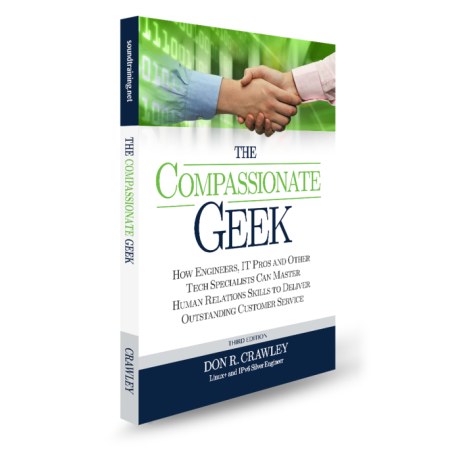Podcast: Play in new window | Download
Subscribe Now Apple Podcasts | RSS
In working to build successful IT careers, there are many roadblocks that can get in the way of our success. I want to focus on three in particular in this blog post. These three roadblocks get in the way of success in our relationships with other people. They are self-defeating, they can undermine even the most well-qualified individual’s career, and they are entirely avoidable and preventable.
Roadblock #1: The Yeah-Buts
I have a friend who is a mental health counselor. He helps people who are struggling with life’s challenges. He has multiple degrees, an abundance of training, and many years of experience. One day, I picked him up at the end of the day. When he got in my car, his eyes were red and his face was ashen. “What’s wrong?”, I asked with concern. “Oh, I’ve been sitting in my office all day, listening to the yeah-buts.”, he sighed. “The yeah-buts?”, I asked. With a sense of heavy resignation, he explained that people come to him for advice when their life isn’t going the way they want. He offers suggestions, based on his training and years of experience, and they respond, “Yeah, but that won’t work for me.” or some similar dismissal. My friend is one of the wisest and kindest people I know. People come to him when they’re experiencing some sort of difficulty in their life, he offers excellent guidance, and some of them dismiss it out-of-hand, without even considering that a change, a different approach might be a good idea. If things aren’t going the way you want, if you’re not getting the promotions or contracts you feel you deserve, if people aren’t embracing your ideas, if success seems just out of reach, maybe it’s time to re-think your approaches to certain aspects of your life. If anyone you respect has ever offered you advice which you’ve dismissed with a “yeah-but”, maybe it’s time to revisit their advice. Be open to new information, new ideas, or even old ideas that might have new relevance on your path to success.
Roadblock #2: The Theys
We humans love to blame other people for our problems. If you’ve ever talked about the ID-ten-t (ID10T) error, the PICNIC error (problem in chair, not in computer), or the PEBCAK error (problem exists between chair and keyboard), you’ve blamed your end users for the problem they’re having. And, the reality is our end users sometimes do things that make us scratch our heads. It’s probably a lot like how our doctor reacts when we keep smoking cigarettes, eat fatty foods, or fail to exercise. I’ve certainly referred to the ID-ten-t, PICNIC, and PEBCAK errors in the past, but today I wonder if an end user’s ability to mess up a system is more of a reflection of poor design on my part than crazy operator error on the part of the user. Look, some of our end users are brilliant. Perhaps they’re scientists, engineers, physicians, professors, attorneys, or successful business people who simply don’t “get” computers. It’s our job, our responsibility really, to find ways to help them, sometimes in spite of their best efforts to keep that from happening. Nobody said this was going to be easy.
Roadblock #3: The Belief That People Skills are Innate
It’s easy to dismiss people skills as a talent with which some people are born. I think that’s probably true. Some babies are charming and outgoing, while others are quiet and reserved. Some seem to be born as extroverts, while others seem to be born as introverts. I was an introvert as a child and, even today, I much prefer working by myself or with a small group instead of hanging out in a large crowd of people I don’t know. I noticed, however, when I was in high school, that the people with people skills got the perks and I wanted those perks. I began what has become a lifelong pursuit to understand how people with people skills do what they do. I decided to try imitating some of the behaviors of the people with people skills. It was pretty awkward at first! With practice, I got better, just like sports or music. What I learned was that people skills really are just beliefs and behaviors. I could adopt both and adapt both to my personal style and make it work for me.
The lesson is fairly straight-forward. Anyone can learn people skills. Just like music or sports, people skills require practice and some people will be better than others, but it’s not a competition. It’s a matter of working to learn and master new skills, giving yourself the grace to fumble sometimes, and knowing that we humans, every single one of us, are amazingly adaptable. We can learn. We can grow. We can be better tomorrow than we are today.
For More Ideas on How to Improve Communication and Customer Service Skills
Bring my IT customer service training seminar onsite to your location for your group, small or large. Click here for the course description and outline.
 Pick up a copy of my IT customer service book The Compassionate Geek: How Engineers, IT Pros, and Other Tech Specialists Can Master Human Relations Skills to Deliver Outstanding Customer Service, available through Amazon and other resellers.
Pick up a copy of my IT customer service book The Compassionate Geek: How Engineers, IT Pros, and Other Tech Specialists Can Master Human Relations Skills to Deliver Outstanding Customer Service, available through Amazon and other resellers.
Please Leave a Comment
If you find this post helpful or if you have additional thoughts, please leave a comment.



